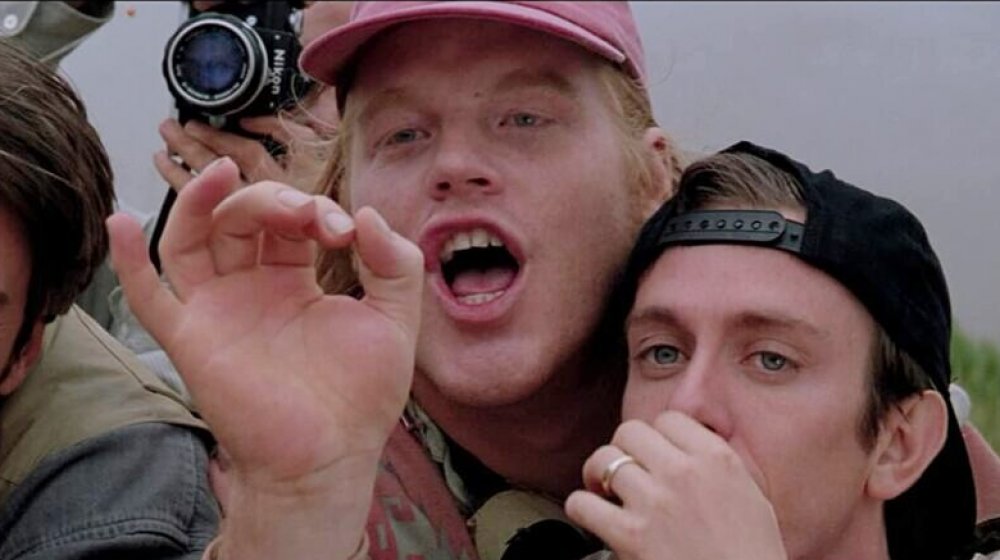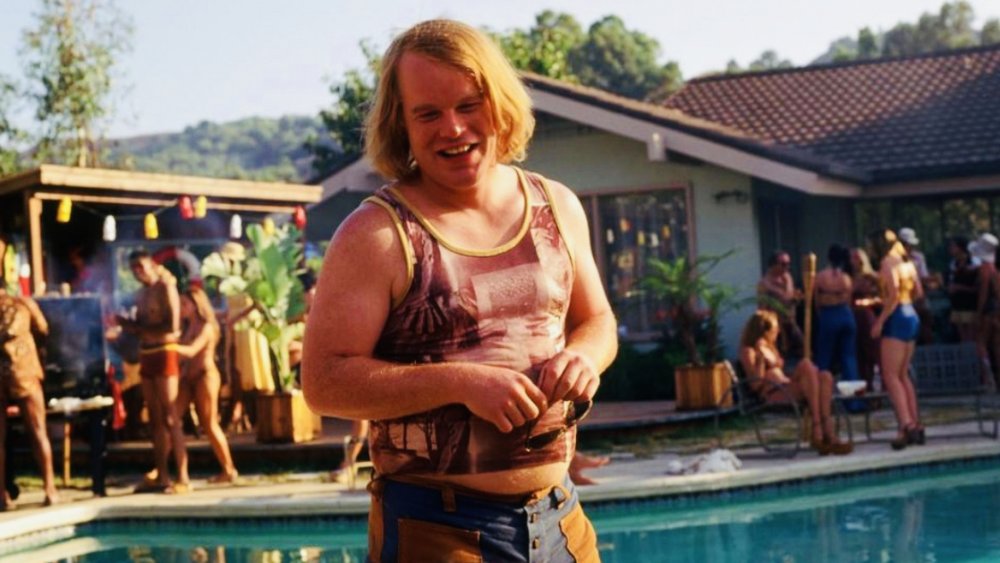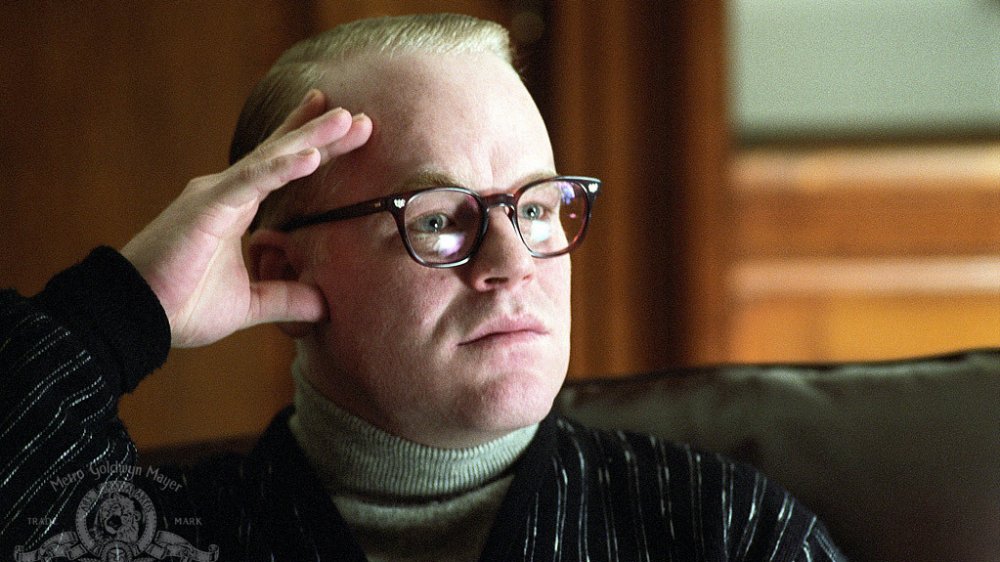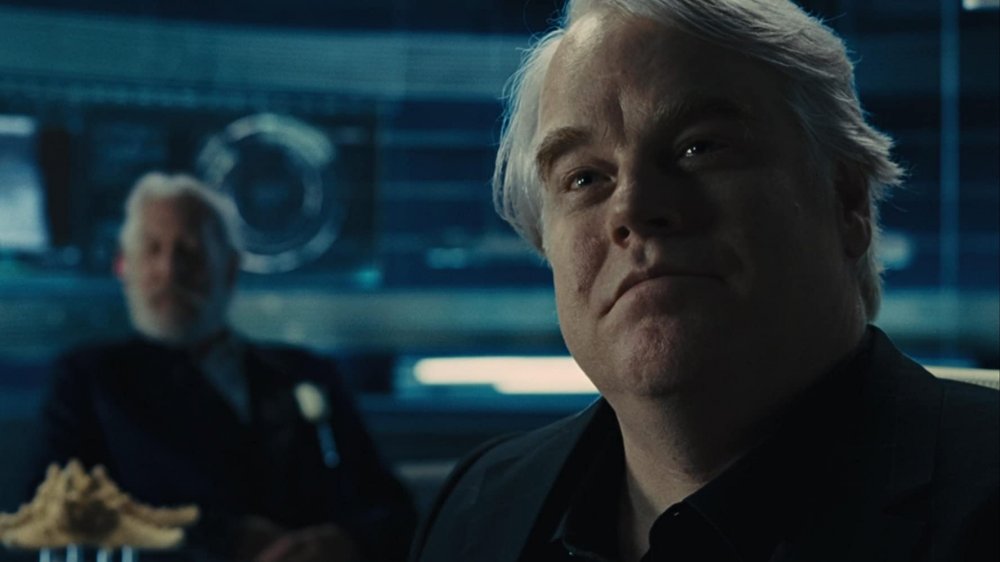Why Dustin Davis From Twister Looks So Familiar
Lately, streaming audiences have been rediscovering the 1996 disaster epic Twister, which — in case it's been awhile, or you never happened to catch it — is one rollicking, goofy good time. The flick stars the late, great Bill Paxton and veteran actress Helen Hunt as estranged husband-and-wife storm chasers who find themselves thrown back together when their attempt to test brand new data-gathering technology brings them directly into the paths of several — progressively larger — tornadoes. The fearless pair rediscover their love while rushing into the heart of each implausibly giant storm, only stopping long enough to grab a hot dog and fuel up at the nearest Benthic station.
The film was a smash hit during its theatrical run, but you may have forgotten just how impressive its pedigree really is. Its executive producers included future Lucasfilm president Kathleen Kennedy and some guy named Steven Spielberg. Its screenplay was co-written by Michael Crichton, author of Jurassic Park and a ton of other excellent novels. At the helm, meanwhile, was director Jan de Bont, who was fresh off of the box office success of Speed.
Twister's supporting cast also includes several ringers, with Ferris Bueller's Day Off's Alan Ruck, The Princess Bride's Cary Elwes, and one shaggy, open-faced actor in the role of fellow storm chaser Dustin "Dusty" Davis who you have probably seen many times before. If you're having trouble placing his face, allow us to help — and if you're unfamiliar with his work, then congratulations, you've just lucked into the discovery of Philip Seymour Hoffman, one of the finest actors of his generation. Here's why Dustin Davis from Twister looks so familiar.
Philip Seymour Hoffman made a huge splash in relatively small roles
Hoffman first began turning up in feature films in the early '90s, after getting his feet wet with small television roles on series like One Life to Live and Law & Order. He immediately began to make his name as a dependable and thoughtful supporting actor, and even if the roles were small at first, many of the films he appeared in were widely seen. He popped up as George Willis, Jr. in the Al Pacino vehicle Scent of a Woman, as Frank Hansen in the Alec Baldwin-Kim Basinger actioner The Getaway, and as Gary in the Andy Garcia-Meg Ryan romantic drama When a Man Loves a Woman before scoring his supporting role in Twister — but it wasn't until 1997 that he landed the part that would really put him on the radar of casting directors.
This was in Boogie Nights, Paul Thomas Anderson's masterful fictionalized examination of of the '70s pornography scene through the eyes of one of its biggest stars. Hoffman appeared as Scotty J., a camera operator who develops an unrequited crush on the star in question, Mark Wahlberg's Eddie Adams (known professionally as Dirk Diggler). It was in this role that Hoffman's uncanny knack for crafting strongly drawn characterizations with little screen time became obvious, and it wasn't long before that talent started being put to use in earnest.
In 1998 and 1999 alone, Hoffman appeared in no fewer than nine feature films, including such classics as The Big Lebowski (as Brandt, Jeffrey Lebowski's intensely dramatic manservant) and Magnolia (in which he re-teamed with Anderson, and not for the last time). That two-year stretch, though, was just his warm-up act — and in the next decade, the true depths of his ridiculous talent would be revealed.
Philip Seymour Hoffman's career took off in the aughts
In the first half of the '00s, Hoffman continued his winning strategy of making huge impressions with indelible characterizations in relatively minor roles. He memorably appeared as music critic Lester Bangs in director Cameron Crowe's Almost Famous, once again teamed with Anderson for Punch-Drunk Love (the movie that proved to a shocked world that Adam Sandler can really act), popped up as the doomed journalist Freddy Lounds in the Silence of the Lambs prequel Red Dragon, and starred as Jacob, the best friend of Edward Norton's prison-bound drug dealer, in Spike Lee's 25th Hour.
Finally, in 2006, Hoffman was handed his first lead role — and it was one that he could and did sink his teeth into. He portrayed the legendary author Truman Capote in Capote, a biopic which explored the genesis of one of his most famous works, the true-crime novel In Cold Blood. Hoffman utterly inhabited Capote in a performance which elevated the film to the ranks of all-time great biopics, and it landed the actor his first (and only) Academy Award for Best Actor.
Hoffman then took a brief detour into genre flicks with appearances as the villainous Owen Davian in Mission: Impossible III, as Jon Savage in the dramedy The Savages, and as Andy in the crime thriller Before the Devil Knows You're Dead. He would score another Oscar nomination — this time for Best Supporting Actor — for his role opposite Tom Hanks in the 2007 biopic Charlie Wilson's War, but perhaps his single greatest achievement came the following year. Hoffman gave a towering performance in the lead role of Caden Cotard in Synecdoche, New York, the directorial debut of famously idiosyncratic screenwriter Charlie Kaufman. It was called "a film with the richness of great fiction" by no less an authority than the great Roger Ebert and was singled out by many critics as the best film of its year, yet somehow, it failed to secure even a single Oscar nomination.
Philip Seymour Hoffman took on more heavyweight roles and a major franchise before his death
Hoffman's late-career output, true to form, comprised a number of smaller quirky films in addition to a couple of high-profile, widely acclaimed dramas and one major genre franchise. He appeared as Art Howe in the acclaimed, Oscar-nominated 2011 biographical drama Moneyball, and teamed with Anderson one final time to star opposite Joaquin Phoenix in the 2012 drama The Master. For their work in that film, Hoffman, Phoenix, and their co-star Amy Adams were all nominated for Academy Awards.
Hoffman also took on parts in little-seen flicks such as the 2012 musical drama The Late Quartet and the 2014 potboiler God's Pocket, but he found perhaps his widest audience ever when he appeared as Plutarch Heavensbee in 2013's The Hunger Games: Catching Fire. He would go on to reprise the role in 2014's The Hunger Games: Mockingjay — Part 1 and 2015's The Hunger Games: Mockingjay — Part 2, the latter of which would unfortunately be his final credit.
On February 2, 2014, Hoffman was discovered dead at his Manhattan home by a friend; he was only 46 years old. His death was widely mourned in Hollywood circles and the world over, and in the years since his passing, his reputation has only grown. In an op-ed penned for the New York Times in July 2014, the author John le Carré — whose novel A Most Wanted Man was adapted into a film starring Hoffman — remarked on his legacy with trademark eloquence.
"He did what only the greatest actors can do," le Carré wrote. "He made his voice the only authentic one, the lonely one, the odd one out, the one you depended on amid all the others. And every time it left the stage, like the great man himself, you waited for its return with impatience and mounting unease. We shall wait a long time for another Philip."



